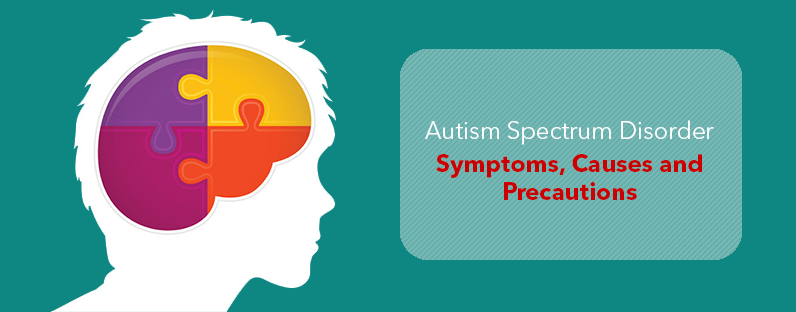Autism Spectrum Disorder- Symptoms, Causes and Precautions
Autism Spectrum Disorder is a brain development-related condition that affects how a person perceives and socializes with others, causing social interaction and communication difficulties. The disorder also includes limited and repetitive patterns of behavior. In autism spectrum disorder the term “spectrum” refers to the wide range of symptoms and severity.
Autism spectrum disorder encompasses disorders previously considered separate — autism, Asperger’s syndrome, childhood disintegrative disorder, and an undefined type of omnipresent developmental disorder. Some people also use the word “Asperger’s syndrome,” which is usually considered to be on the mild end of autism spectrum disorder.
Autism spectrum disorder occurs in early childhood and eventually causes difficulties working in society — for example, socially, in school and at work. Children often experience autism signs during the first year. A small number of children tend to develop normally in the first year, but go through a period of regression between the ages of 18 and 24 when they show signs of autism.
Read More: Nutrition for Kids: Complete Guideline
Symptoms of Autism Spectrum Disorder
Some children exhibit symptoms of early childhood autism spectrum disorder, such as decreased eye contact, lack of response to their name, or, caregiver indifference. Most children can grow normally for the first few months or years of life, but then they suddenly become withdrawn or violent or lose their already acquired language skills. Signs are generally seen at age 2.
A growing child with an autism spectrum disorder will likely have a particular behaviour pattern and severity level — from low functioning to high functioning.
Some children with autism spectrum disorder have cognitive problems, and others have symptoms of lower average intelligence. Many children with the disorder have average to high intelligence — they learn quickly but have difficulty communicating and implementing what they know in daily life and adapting to social situations.
The severity can sometimes be difficult to determine because of the unique mixture of symptoms in each child. It’s generally based on impairment levels and how they affect the ability to function.
Below are some typical symptoms of people suffering from autism spectrum disorder.
Social communication and interaction
A child or adult with an autism spectrum disorder, including all of these symptoms, can have issues with social interaction and communication skills:
- Doesn’t respond to his or her name or may not seem to notice you at times
- Avoid cuddling and holding and seems to prefer playing alone, returning to his or her own world
- Has weak eye contact and lacks facial expression
- Doesn’t talk or pause speech or loses previous ability to utter words
- Can’t start a conversation or keep a conversation going, or just start a to make request or label item
- Talks in an odd sound or rhythm and can use a voice song or a robot-like speech
- Repeat words or phrases literally but don’t understand how to use them.
Read Also: How Fitness Improves Your Physical & Mental Health?
Patterns of behavior of Autism Spectrum Disorder
An infant or adult with autism spectrum disorder can have limited, repetitive behavioral patterns, interests, or behaviors, including any of these signs:
- Performs repetitive motions like rocking, spinning or hand flapping
- Performs self-harming practices such as bite or head-banging
- Establishes specific habits or rituals and is upset at the slightest changes
- Has a preference of a specific food, like eating only a few foods or refusing foods with a certain texture
Read Also: What Is Bipolar Disorder – Symptoms, Causes
When to see a doctor
Babies develop at their own pace, and many do not follow the exact timelines found in some books about parent ship. But usually, children with autism spectrum disorder display certain signs of delayed development before age 2.
If you’re worried about the growth of your child or think that your child may have an autism spectrum disorder, speak to your doctor about your concerns. The condition associated symptoms can also be attributed to other developmental disorders.
Signs of autism spectrum disorder frequently occur early in development when the language skills and social interactions are clearly delayed. Your doctor may recommend developmental tests to decide whether your child has cognitive, linguistic, and social delays if your child has:
- Doesn’t respond with a smile or a happy face for 6 months
- Doesn’t imitate sounds or facial gestures for 9 months
- Doesn’t gesture — like point or wave — for 14 months
- Doesn’t say single words by 16 months
Causes of Autism Spectrum Disorder
No single known reason for Autism Spectrum Disorder. Given the nature of the condition and the varying signs and severity of the condition, there are likely several causes. It may play a role in both genetics and environmental factors.
Risk factors of Autism Spectrum Disorder
There are increasing numbers of children diagnosed with an autism spectrum disorder. Whether this is due to better detection and reporting or a real increase in the number of cases, or both, it is not clear.
Autism spectrum disorder affects children of all races and nationalities but there are certain causes that raise the risk of an infant. Those may include:
- Your child’s sex
- Family history
- Extremely preterm babies
- Parents’ age
Read Also: Top 10 Workouts To Cure Depression & Anxiety
Complications
Problems with social, communication, and behavioral interactions can lead to:
- Problems in school and with successful learning
- Employment problems
- Inability to live independently
- Social isolation
- Stress within the family
- Victimization and being bullied
Prevention
There is no way to avoid autism spectrum disorder but treatment options are available. Early diagnosis and intervention is of the greatest help and can behavior improve skills and language development. Intervention at any age is beneficial. Although children do not generally outgrow symptoms of autism spectrum disorder, they may learn to function well.
